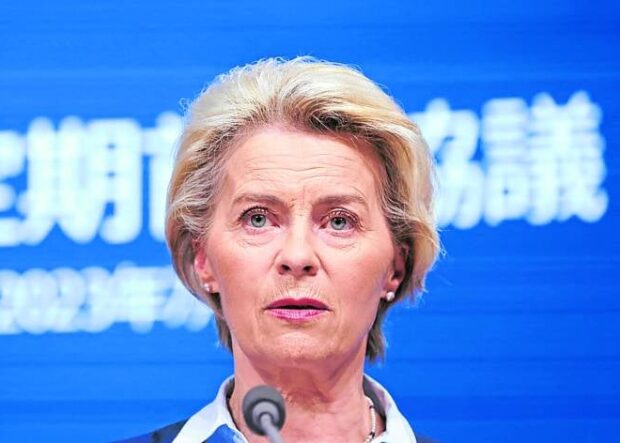EC leader must also tackle human rights under Marcos–HRW

Ursula von der Leyen —REUTERS
European Commission (EC) President Ursula von der Leyen will begin her two-day visit to the Philippines tomorrow, and an international watchdog hopes that human rights will be high on her agenda with President Marcos.
“[Von der Leyen] should make it clear to President Marcos that while a different narrative on human rights is welcome, his administration needs to walk the talk,” said Claudio Francavilla, senior European Union advocate of New York-based Human Rights Watch (HRW).
In a statement on Saturday, Francavilla said Red-tagging, “drug war” killings and repression had continued under Mr. Marcos despite his pledge to protect human rights on his watch.
The Palace earlier said Von der Leyen is coming to the Philippines at the invitation of President Marcos, whom she met during the EU-Asean Commemorative Summit held in Brussels, Belgium, in December 2022.
Historic visit
She will be the first head of the EC—which was established in 1953—to go on an official visit to the country in almost six decades of diplomatic ties between Manila and the political arm of the European Union.
Article continues after this advertisementPhilippine-EU relations have warmed up under Mr. Marcos, in contrast to the icy period under former President Rodrigo Duterte, who had lashed out repeatedly against EU ambassadors and lawmakers for criticizing his bloody antidrug campaign.
Article continues after this advertisementAdding to the strain was EU’s call for the release of detained former Sen. Leila de Lima, which Duterte allies considered an interference in the country’s internal affairs.
In contrast, Mr. Marcos’ policy of being “friend to all, enemy to none” has raised expectations of closer ties, as evidenced by Von der Leyen’s visit.
According to the EU Embassy in Manila, the visit from July 31 to Aug. 1 “aims to give a new impetus to the EU-Philippines bilateral relations” and discuss matters of mutual interest including trade, investments, digital transition, security and the Global Gateway cooperation.
“The region’s growing economic, demographic and political weight makes it a key player in shaping the rules-based international order and in addressing global challenges,” the European Union said.
Meeting with business
Aside from Mr. Marcos, Von der Leyen will also have a meeting with the business community, organized by the European Chamber of Commerce of the Philippines (ECCP) in partnership with the Makati Business Club.
“Over the years, we have witnessed a strong partnership between the European Union and the Philippines in important and strategic areas such as trade, investment, climate action and international security, among others,” the ECCP said in a statement last week.
The European Union is the Philippines’ fourth largest trading partner by regional bloc, with trade between the two sides totaling €15.2 billion ($16.6 billion) in 2021, according to the EC.
Trade perks
The EC president’s visit comes as the EC proposed to extend by four years the country’s Generalized Scheme of Preference (GSP+) trade privileges that are set to expire by the end of 2023.
The recommendation has yet to be decided on by the European Parliament.
More than 6,000 Philippine exports to the European Union—such as fruits, meats, vehicle parts and other local products—are given special incentives and zero tariffs under the GSP+. The renewal of these incentives is hinged on the country’s adherence to EU human rights standards. For Francavilla, efforts to strengthen Philippine-EU cooperation must be anchored on the Marcos administration’s commitment to human rights.
“[They] should be based on the government ending its abuses, delivering on human rights reform, and securing accountability for past and ongoing crimes,” he said.